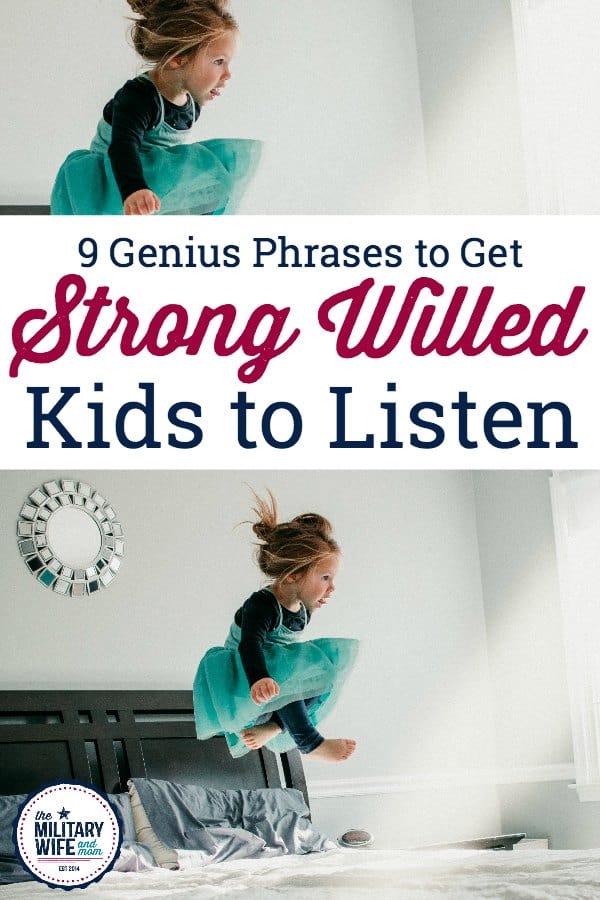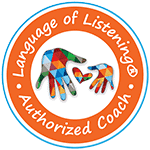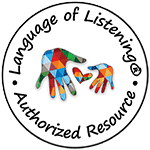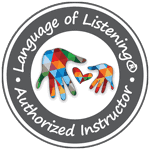The situation had “meltdown” written all over it. It was a fun, yet incredibly long day at the zoo for the kids. I knew our oldest – a strong willed child – wasn’t going to want to leave. In his mind, we could sleep there with the animals and everything would be perfect.
As we prepared to break the news, hangry and tired washed over my son like a turbulent tidal wave. Dealing with my strong willed child was going to take a lot of patience.

I braced myself.
The tears were already dropping from my son’s cheeks, and my husband was ready to give up and throw his hands in the air. We had just been discussing why parents yell so I knew my husband was trying desperately to keep his cool.
He glanced over in my direction, giving me “the look” and said, “Can you deal with this situation?”
This is when I bring out my Strong-Willed Child Phrases. They are a series of quick parenting phrases that I use in just about any situation.
These phrases for strong-willed kids can…
- Help with aggressive behaviors
- Improve listening
- Lessen bedtime tantrums
- Decrease whining in kids
- and much more
9 things to say when dealing with a strong-willed child.
Strong-Willed Child Phrases are awesome because strong-willed kids have a high need for power. These phrases that can help fill a child’s “power tank” while still keeping your boundaries.
Furthermore, strong willed kids are easily misunderstood. These phrases help me remember to name the positive when dealing with a strong-willed child. The more you name behaviors you like, the more kids show you those behaviors.
1. “It’s disappointing when…”
It’s difficult to watch a child struggle with intense emotions. Sometimes it feels so painful to watch your child hurt that you wish it would all go away. This is when you find yourself trying to squash the emotion by saying, “You’re fine” or “Stop crying” or “This isn’t a big deal” or “Too bad.”
But, in the past, when I tried to squash the emotion, I never gave my son the chance to cope, develop self-control, or calm himself. One excellent way to help kids learn to cope on their own is to meet them right at the emotion.
You can say things like…
”It’s disappointing when you have to leave the zoo.”
“It’s disappointing when you have to go to bed at night.”
“It’s disappointing when you have broccoli on your plate at dinner.”
2. “You don’t want to…”
Meeting your child right at their emotion will instantly build connection, and your child will think, “My mom gets it. She really gets it.” The more you dive straight into your child’s feelings with empathy and validation, the easier it is for your child to process and move forward.

You can say things like…
“You don’t want to leave the zoo.”
“You don’t want to share your toys.”
“You don’t want to get dressed.”
3. “This is frustrating for you.”
This is another key phrase that will help your child feel understood. The goal of using empathetic parenting in these phrases is not to automatically switch off your child’s emotions, but rather to coach and help them feel heard and understood so they open up to your guidance.
It usually takes far less time for a child to process and move forward with their emotions than if you skip empathy altogether.
Related: 2-year-old not listening? Try this remarkable tip
4. “You wish you could…”
I absolutely love diving into emotions with a child using fantasy “wish” statements. Imagination and reality are very close neighbors in childhood.
You can grant everything your strong-willed child wants in the moment by using “You wish you could…” statements. This can immediately fill a child’s connection tank when you validate how badly they want something.
It may sound something like this…
“You wish you could stay at the zoo all day long. You wish you could grab a tent and sleeping back and stay right here all night. You wish could help the zookeepers and eat breakfast here in the morning. You wish this would never end.”
5. “You know exactly what you want.”
The most important thing you can do when dealing with a strong-willed child is to shift your perspective from seeing what you don’t like to seeing the Hidden Strength in each situation. When strong-willed kids are engaging in a power struggle they almost always know exactly what they want.
This is a STRENGTH of strong-willed kids…they’re decisive thinkers!
6. “You figured out a way to make it work.”
Each time your strong-willed child problem solves through a situation or discovers an acceptable alternative behavior, remind them: “You figured out a way to make it work.”
You can expand further by adding, “You didn’t want to do it. It was hard for you to find another solution, but you found a way to make it work.”
7. “You did it all by yourself.”
All strong-willed kids desire mastery. Recognizing your child’s ability to master something independently without outside help will immediately fill his or her “power tank.”

Related: 31 Printable Affirmation Cards for Kids — They’ll Actually Use
8. “You have two choices.”
Offering choices within your parental boundary is a very simple way to help strong-willed kids feel in control. In my earlier example about leaving the zoo, I dove straight into my son’s emotions with empathy and validation. But I still needed to find a way to fill his power tank after leaving the zoo.
Shortly after he calmed down, he mentioned that he was hungry. There was my golden window of opportunity: I gave him two choices of a snack in the car and he instantly seemed satisfied with the power to choose what he ate.
9. “You can decide this for yourself.”
Anytime you can allow your strong-willed child to make a decision, embrace it by saying, “You can decide this for yourself.” This will immediately fill the power tank and help your child feel in control.
When you feel at your wits end when dealing with a strong-willed child, remember these Strong-Willed Child Phrases. The more you build connection and fill your child’s power tank, the less he or she will want to fight you or engage in power struggles.
Print this Free Strong Willed Kids printable!
Chances are you won’t remember all the Strong-Willed Child Phrases from this post. Grab your free printable and you’ll also get these BONUS PHRASES! Easy peasy!
Download Your Free Printable
- Download the printable. You’ll get the printable, plus join my weekly parenting newsletter!
- Print. Any paper will do the trick, but card stock would be ideal.
- Place it on your refrigerator. Use it as a quick reference to keep parenting simple!
Want more on parenting?
- 3 Things Every Parent of a Strong Willed Toddler Should Know
- Controlling Kids? The “Secret Sauce” for Gaining Cooperation
- The BIG Reason Why Setting Limits With Your Strong-Willed Child Isn’t Working
- How to Help a Child Focus in the Classroom
I've created a free email series just for you! If you are struggling with teaching your child to listen, this series will help transform your parenting. Yes, really. I've seen my proven strategies work time and time again for parents. I know it can work for you too.
After taking my free email series, you will:
- Learn simple, yet highly effective listening strategies
- Experience a stronger connection with your child
- Enjoy more peaceful parenting days
- Gain more cooperation from your child














I have three children (6, 9, 11 girl, boy, girl) and they are all strong willed in their own ways. Our oldest 11 year old girl is strong willed and stubborn to max. Do you have any advice for older pre-teen and teenage children? I always see blogs about younger children but not older ones. I have used many of the ideas and advice when my children were younger but now they’re getting older. Thank you.
Hey Jennifer,
I don’t have detailed advice for pre-teens or teenagers on this site, but I use a languageoflistening.com approach and it applies to all ages. It always starts with one thing SAY WHAT YOU SEE, in which you describe exactly what you see in the moment without questions, teaching or judgment. If you see something you like, name your child’s strength. If you see something you don’t like, offer your kids something they Can Do instead. So for a pre-teen (hypothetical example here) SWYS may go something like this…”You really don’t want to empty the dishwasher right now. You’d much rather go play with your friends. This is hard for you.” OR “You’re really angry at me right now. You wish you could xyz and you’re not happy with my decision. This is hard for you.” And then dive into strengths or Can Dos depending on what you are seeing.
I LOVE this. These phrases are practical and applicable. Thanks so much!
I’m so glad you enjoyed them!
Choices! I would love the day that choices work! For most strong willed children they dont.
Chips or Godfish? FRUIT GUMMIES!
I have a very strong-willed daughter. Here’s what often works with her (if I have the energy):
Chips or Goldfish? FRUIT GUMMIES!
I wish we could have fruit gummies too. They’re yummy. So… let’s choose Goldfish. Five or Eight? I DON’T WANT GOLDFISH I WANT GUMMIES!
Okay, let’s go with eight. Shall we put them in your hand, or in a container? I WANT GUMMIES!
Let’s put them in your hand. Do you want me to count or you to count? I WANT TO COUNT! ONE TWO THREE…
…and then I allow myself some silent “Yay me!” applause… 🙂
Even I have tried the same at many times and it works.
What’s the follow up statement that actually gets your kid to do what needs to be done???
“It’s disappointing when you have to leave the zoo.” BUT we have to leave anyways? (that just makes mine mad all over again!)
“It’s disappointing when you have to go to bed at night.”
“It’s disappointing when you have broccoli on your plate at dinner.”
I feel there is no follow up phrase required. The less you speak and the more silent you are …. Particularly without asking any questions to the kids, they themselves decide the right things.
I have a 4 year old that is stuck on whining about everything have you got any tips? As it getting gradually worse?
Heck of a job there, it abtolusely helps me out.
I’m so glad!